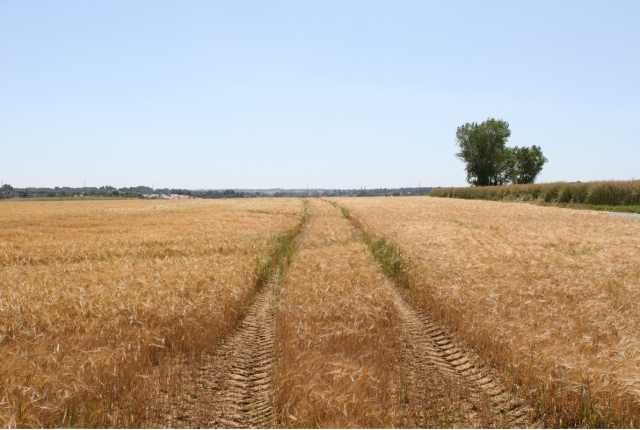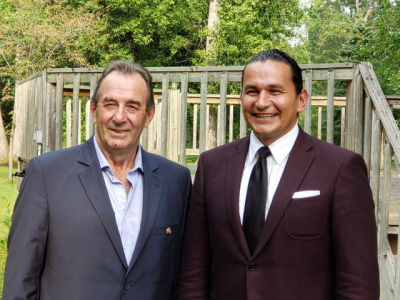 NewsNow
NewsNow
Today is April 20th, commonly refered to as 4:20 by the Cannabis Culture. Even though it’s been half a year since marijuana became legal in Canada, edibles are still not available in stores, though it's been predicted they could be by October 17th.
Trevor Shewfelt, a co-host of the Reefer MEDness Podcast says a lot of people just prefer them over smoking.
“The medicinal people we’ve talked to, that’s the preferred method of taking it in. They don’t like smoking. They just prefer an edible so it’s great for them.”
Shewfelt says there are a lot of positives to edibles like no smell or smoke. Dosing is one downside. If a package is labelled poorly or people aren’t paying attention, it’s easier for people to take too much, though statistics have proven it’s tough to overdose on cannabis. Cannabis overdose is not like an opioid overdose, where death is possible.
Shewfelt says that if you have trusted your dealer for a long time and they charge you a much lower price than a legal store, you might stick with what you know.
which stops many from purchasing legally.
In one of the podcasts, S2E3, they spoke with Dr. Jason Childs, an economist who said that one of the biggest problems he sees is that the black market continues to exist because the legal channels can't compete on price.
“For people to go to a new product that they are not familiar with, where some trust has been established already with the illegal market, one of the worst things you want to do as a marketer is go in at a higher price unless you have a dramatically better product.”
Shewfelt said they interviewed a patient on the Reefer MEDness podcast who is spending thousands of dollars on medical cannabis. One reason the cost is so much is because of all the taxes imposed on the medication.
But there are other things people complain about when they go buy their legal weed, like the packaging.
Shewfelt says environmentally the packaging is not the friendliest thing.
“So the government intentionally said everything should be in a childproof container. So, as a pharmacist this makes sense. But picture a bottle that you would get vitamins in and that’s what the cannabis has to be sold in. So there is a whole lot of bottle for a tiny bit of product.”
Shewfelt hopes down the road we’ll see a more childproof and less packaging intense solution, but we’re not there yet.
Pharmacists are still not allowed to sell medical cannabis in the pharmacy, which Shewfelt does not understand. He calls it a strange system where you get a prescription from a doctor, it gets sent to a licensed producer, and then they send it directly to you.
“It would make so much more sense for it to go through a pharmacy. Because a lot of these people are, frankly, sick and on a bunch of other medications and it would be a good idea for a health care professional to be involved in the making sure what you’re taking cannabis wise mixes with the other medications.”
Shewfelt says he hasn't got anything against licenced producers, but says they don’t know all the other medications people take.
You can learn everything you need to know about how legalization affects the Canadian Cannabis culture by checking out the Reefer MEDness Podcast hosted by Shewfelt and Kirk Nyquist here.
- Details
- Contributed by Josh Sigurdson
Parks Canada is setting areas of Riding Mountain National Park on fire to prevent wildfires from breaking out.
Prescribed fires reduce fuel to lessen the severity of out of control fires, release nutrients, and help keep the ecosystems in the park thriving.
The program will see fires set east of Wasagaming, around Arrowhead Trail, and along Whirlpool River.
RMNP will stay open to visitors, but some smoke will be present and visible. Staff will monitor the wind and try to ensure the smoke won’t affect publicly used areas. Some areas will be closed for a short amount of time to ensure visitors safety.
The program will run when conditions allow until May 10th.
For up-to-date information about area or facility closures and other updates on the prescribed burn, please check the park’s website at parkscanada.gc.ca/riding and Facebook page at facebook.com/RidingNP.
- Details
- Contributed by Josh Sigurdson
A three-session program to help people deal with problematic eating behaviours will be in Dauphin.
Holly Reimer says the three dates for the craving change program are May 2nd, 9th, and 16th from 6:30-8:30 at the Dauphin Community Health Services.
Since the program is in Dauphin, PMH understands some people from farther away communities won’t be able to travel for the sessions. So through telehealth, people can participate in Ste. Rose as well.
Reimer says the first session of the Craving Change Program includes a lot of reflective activities.
“Regarding triggers for problematic eating and there’s some homework to go along with that. We teach a few different ways to think about hunger and what’s triggering problematic eating behaviours.”
In the second session, they will be talking about 10 different strategies to choose from to avoid problematic eating behaviours.
The group dynamic of the sessions will help people learn from each other.
Participants will learn how to understand why they eat the way they do, and some strategies to help deal with problematic eating behaviours. Some things people could have a problem with are what they’re eating, the amount they eat, or emotional eating when they aren’t hungry.
To register for the free program, call the toll free line, 1-877-509-7852.
- Details
- Contributed by Isaac Wihak
With more people on the roads for the Easter long weekend, MPI is asking for drivers to focus on road safety.
On average 1 person is killed and 70 people are injured in collisions in Manitoba over the 3 day holiday.
MPI has some safety tips for drivers this weekend.
First off, don’t drive impaired, on average 25 people are killed each year due to impaired driving.
Secondly, buckle up, a person is 40 times more likely to be killed and 5 times more likely to be seriously injured without the seat belt.
Third of all, don’t text and drive, on average 30 people are killed in a distracted driving collision yearly in Manitoba.
Finally, slow down, almost 20 people on average are killed in a speed-related collision in Manitoba.
- Details
- Contributed by Isaac Wihak
Accessibility was the theme during a presentation at Barker School on Thursday.
Dauphin MLA Brad Michaleski, other provincial government officials, and representatives from the Mountain View School Division were at the school to talk about the improvements recently done to the building.
A full-sized elevator was just one part of the 1.47 million dollars in upgrades. Other improvements included barrier-free washrooms that made the amenities easier for staff and students.
Donna Davidson, the superintendent and CEO for Mountain View School Division, says it’s important to maintain and upgrade their facilities so that they can serve the students of today but also children in the future. She notes that that is an efficient way to use taxpayers’ dollars.
“There’s evidence that indicates that if children are educated in facilities that are safe and healthy, their outcomes are better,” said Davidson. She goes on to explain how some consider schools as the third teacher. It’s not just the physical building but also how the teacher structures their classroom, where they put the desks and how they use that physical space.
She says at one time they might not have any students who require an elevator, but during the year there are always cases where temporary injuries occur, and students need to use crutches or a wheelchair.
She also mentioned that the elevator is beneficial for parents and other members of the community to be able to access all parts of the building. One example included parent-teacher interviews where parents who struggled with stairs were unable or struggled to get to the second or third floor because of the lack of accessibility.
“It’s a big part of the community. Barker School has been around for a long time, lots of families have gone through these facilities,” said MLA Brad Michaleski. “Accessibility is a great addition.”
The full-sized elevator is replacing a stair lift. The old system took a long time to use and only allowed one student to use it at a time. Davidson explains that you had to strap in and then slowly elevate to the top. With the elevator, students can now be wheeled in and brought to all four stops, including the basement.
- Details
- Contributed by Josh Sigurdson
Today at city hall, the Riding Mountain UNESCO World Biosphere Reserve is in Dauphin for a stewardship water day.
Zebra mussels and blue-green algae bloom are the two major threats to water in the biosphere reserve and that’s the focus of the meeting at city hall.
Jim Irwin, chair of the Riding Mountain UNESCO World Biosphere Reserve, says the Red River, Lake Winnipeg, and Cedar Lake are under the threat of zebra mussels.
Some of the lakes in the area have heavy algae blooms as well. The toxic blue-green algae bloom is the concern.
The problem with these invasive species is how easily they can spread unknowingly. Part of the discussion today is how people and groups can take action to keep the waters clean.
Making the public aware of the two threats goes a long way to stop the transfer of the invasive species.
In Manitoba, it is the law that you have to dry out watercraft and water-related equipment so the veligers, which are zebra mussel larva, die. That law is to clean, drain, dry and dispose of any unwanted bait and worms. By law, if you are coming out of contaminated or invaded areas you have to decontaminate.
- Details
- Contributed by Isaac Wihak
The two men involved in the armed robbery at the Beach Road Service on Sandy Bay First Nation haven’t been found yet.
The incident occurred late in the evening on Monday, April 15th, at 11:06.
Entering from the back of the store, the two men pointed firearms at the two employees and proceeded to leave with cash and cigarettes, they used an ATV to escape.
Manitoba First Nations Police Service is asking for the public’s assistance in identifying the suspects who are considered armed and dangerous.
If you have information on who the two men could be, call the MFNP Sandy Bay Detachment at 1-204-843-7705, or Crime Stoppers at 1-800-222-8477.
- Details
- Contributed by Isaac Wihak
MacKenzie Middle School is getting major upgrades to a 60-year old wing of the building including a roof replacement.
The provincial government is investing $57.5 million into 59 infrastructure renewal projects across the province.
A comprehensive renewal at MacKenzie Middle School will see at least $4 million in upgrades.
Donna Davidson, the superintendent and chief executive officer for Mountain View School Division, says these upgrades are necessary to support MVSD's mission to create learning environments that are inclusive and safe for all students. She says this is done “so they can participate actively in all aspects of school life and reach their full potential.”
“It’s important to just keep maintaining. It’s an ongoing responsibility of the government and it’s great to see the commitment that’s going into the schools in the Dauphin region,” said MLA Brad Michaleski. “Regular maintenance, these things are significant additions because the accessibility issues haven’t been addressed and now they are.”
It will also see a new mechanical heating, ventilation and air-conditioning (HVAC) system and a foundation upgrade.
To improve accessibility, a new link will connect the second-storey wing to the main building and two accessible washrooms will be installed.
“That’s what we want to have, an environment where kids are able to make their way, and everybody, to make their way around the schools and use all the facilities,” said MLA Brad Michaleski.
“Our ongoing investment in school infrastructure will strengthen buildings and improve accessibility so that Manitoba students can receive a quality education for generations to come,” said Education and Training Minister Kelvin Goertzen in a media release.
Davidson notes, “It’s critical that we continue to maintain our infrastructure. We can’t be continually replacing schools if we don’t maintain them.”
Construction is slated to begin this summer.
- Details
- Contributed by Josh Sigurdson
There has been more uncertainty in farmers’ decision making this year as trade issues, and commodity price drops have their effects.
Jim Kaleta, the owner of Dauphin Plains Seeds Limited, says most producers are sticking with their rotations, but there is a slight shift to growing other commodities.
“We’ve seen increased interest in barley, some in oats, and also some in flax seed. Guys are looking to diversify some of their cropping plans to hopefully have things that are going to move and help them with their cash flow needs come this winter.”
Heading into this growing season farmers are dealing with higher costs and lower commodity prices.
“Commodities have went down. We’ve also seen increases in costs. Nobody has to tell anybody out there what’s happening with prices of energy. The diesel fuel gas and stuff has taken off.” He continues saying the gas does not match the barrel price or the foreign exchange rate very well. Higher energy prices have also pushed up farmers’ fertilizer prices. The carbon tax will indirectly affect farmers. From trucking, to parts, to machinery equipment deliveries there are added costs to producers.
On the weather side of things, Kaleta says he hasn’t heard many complaints about the weather conditions around the Parkland. He does not think too many people are worried about moisture levels. Although he says cattle producers might be a little more concerned, especially in areas east of Dauphin. “Eddystone, through that way where it was extremely dry there last summer and again last fall. They are going to need moisture to help their forage crops along.”
Kaleta noted there are concerns further west, noting people who have travelled west of Regina to Calgary said there was hardly any snow or moisture most winter.
- Details
- Contributed by Josh Sigurdson
A Gilbert Plains man who was charged in a stabbing incident back in February appeared in Dauphin court.
Roger Keshane has been adjourned until next Tuesday, and the 17-year-old who was charged as well will appear in court May 22nd.
The incident occurred around 11:15 pm on February 12th.
The two men assaulted and stabbed a 36-year-old man when he answered the door.
The two men proceeded to take a small amount of cannabis from inside the home and then fled in a vehicle.
If you would like to know more about the incident, click here.
- Details
- Contributed by Isaac Wihak
Canola growers have the opportunity to ask questions about the trade dispute with China during a webinar this afternoon.
The Canola Council of Canada is hosting the webinar to discuss what farmers should know about the issue and will address farmers' questions and concerns.
Canola growers will have the opportunity to submit questions and concerns once they register for the webinar. After registering, they will receive information about how to join the webinar by phone for audio only or through a computer to see the speakers. Those who join the webinar from a computer can also submit questions during the event.
The CCC is holding this on behalf of growers and the entire canola value chain. They are working closely with the Government of Canada to resolve challenges facing canola seed exports to China.
The webinar includes presentations from CCC board chair Charlene Bradley, CCC President Jim Everson and Canadian Canola Growers Association CEO Rick White, followed by 15 to 20 minutes for questions.
The presentation begins at 2 pm today.
The webinar will not be recorded.
You can register for the webinar by clicking here.
- Details
- Contributed by Josh Sigurdson

















